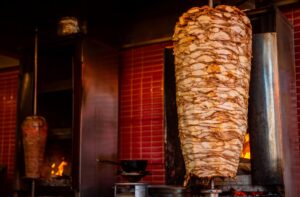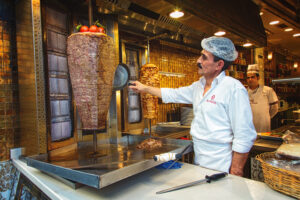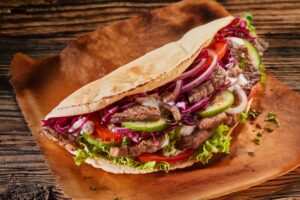From Soho to Everywhere: The Rise of the Kebab Shop in the UK
The Rich History of the Kebab Shop
Nestled in the bustling streets of London, the first Turkish Restaurant in the UK began trading in 1940s Soho as The Istanbul. The kebab shop has become a cornerstone of culinary heritage and others like it only flourished in the 1970s.
Founded by a Turkish immigrant, the shop initially catered to a small but growing community eager for authentic tastes from the homeland. Over the decades, it has adapted to changing palates whilst staying true to its traditional recipes.
The kebab shop is more than just a place to eat; it is a vibrant community hub where stories, cultures, and flavours intermingle. The shop has seen generations of customers, from students seeking a late-night snack to families enjoying a casual meal.
The owner, now in his twilight years, fondly recounts how the shop has played a pivotal role in popularising kebabs in the UK, transforming from a niche ethnic eatery to a beloved national institution.
As the years have passed, the shop has evolved but never strayed from its core values of authenticity and quality. Its enduring popularity serves as a testament to the rich, multicultural tapestry of British cuisine, underscoring the profound impact of immigrant contributions on the nation’s food culture.

Journey to the UK: How the Kebab Made Its Way Over Here
The journey of the kebab to the UK is a fascinating one, steeped in history. The origins of kebabs can be traced back to the Middle East, where various forms of skewered and grilled meat have been enjoyed for centuries.
As Turkish, Cypriot and Kurdish migrants began to arrive in the UK in the post-war period, they brought with them their culinary traditions, including the iconic kebab.
By the 1960s, kebabs started gaining popularity in urban centres, particularly in London, where the melting pot of cultures allowed for culinary experimentation and innovation.
The 1970s saw the rise of the doner kebab, a variant made famous by its rotating vertical grill, making it an instant hit with late-night revellers and those seeking a quick, satisfying meal. As the kebab’s popularity grew, so did the number of kebab shops across the country, each adding its unique twist to the traditional dish.

The Kebab in the UK’s Meat Industry: A Statistical Overview
The kebab’s significance within the UK’s meat industry is undeniable. Recent data reveals that the kebab sector boasts an impressive valuation of £2.2 billion, supported by approximately 20,000 kebab shops spread across the nation.
A striking 80% of these establishments are run by families of Turkish origin, highlighting the deep-rooted influence of Turkish culinary traditions in Britain.
The popularity of kebabs is particularly evident among younger demographics, with a survey by the British Meat Processors Association indicating that 44% of individuals aged 18 to 24 enjoy kebabs at least once a month.
This rising consumption trend is driven by the kebab’s convenience and affordability, making it a preferred choice for many.
Additionally, the market is witnessing a shift towards gourmet kebabs, which feature premium meats and inventive flavours. This trend caters to both traditional enthusiasts and adventurous foodies, contributing to the kebab’s expanding footprint in the meat industry.

Cultural Significance and Community Impact
The oldest kebab shop in the UK transcends being a mere food outlet, evolving into a cultural landmark that brings together a diverse range of people. It has created a welcoming space where individuals from different backgrounds can enjoy the shared experience of savouring a delicious kebab.
This establishment has played a pivotal role in fostering community cohesion, acting as a social hub where stories are exchanged and friendships are formed.
The shop has also contributed to the broader acceptance and celebration of multiculturalism within British society. Its presence in the neighbourhood signifies more than just culinary diversity; it represents the successful integration of immigrant communities into the UK.
Local events and food festivals often highlight the kebab as a staple, demonstrating its significance in local culture and cuisine.
Additionally, the shop has inspired newer generations to appreciate and continue the tradition of kebab-making, ensuring that this culinary art is passed down and remains a vital part of the British food scene. This establishment exemplifies how food can serve as a powerful medium for cultural exchange and community building.

Challenges and Future Prospects
Economic pressures, evolving consumer preferences, and the lingering effects of the pandemic have compelled the oldest kebab shop in the UK to navigate significant challenges. The increasing costs of quality meat, coupled with rising competition from fast-casual dining and delivery services, necessitate innovative operational strategies to stay relevant.
Additionally, supply chain disruptions and fluctuating meat prices have posed further hurdles to maintaining consistent quality and affordability.
Despite these challenges, the future of this iconic establishment holds promise. Embracing a renewed focus on sustainability and local sourcing, the shop is actively exploring ways to innovate its menu while preserving its traditional roots.
The rise in consumer demand for authentic, artisanal foods aligns well with the shop’s commitment to quality and heritage.
Furthermore, with the meat industry increasingly prioritising ethical practices and sustainability, kebab shops that adopt these values are likely to attract a conscientious customer base.
By adapting to contemporary trends and upholding its rich cultural legacy, the oldest kebab shop in the UK is well-positioned to continue thriving in the dynamic culinary landscape.
Read full article Share on X